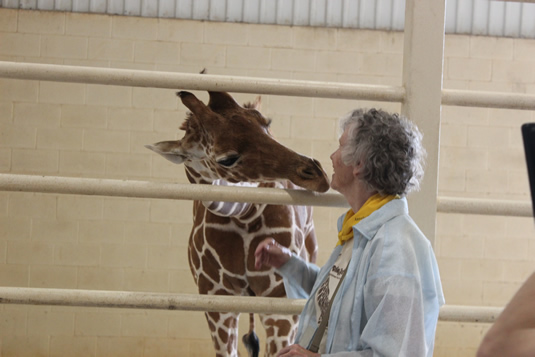A new documentary about a renowned Canadian zoologist is coming to Winnipeg this month.

It’s a project filmmaker Alison Reid says is an unusual kind of love story – that of a pioneering female scientist and her lifelong passion for giraffes.
Anne Innis Dagg may not be a household name like other women who devoted their lives to similar fields of study, but her 1956 solo trip to South Africa pre-dates even icons like Jane Goodall and Dian Fossey, and was an unprecedented accomplishment at the time.
Reid said her documentary subject’s tenacity and dedication to her work was part of the appeal of making the film, entitled ‘The Woman Who Loves Giraffes’.
“It almost seemed like the animal was imprinted on her, her love for it,” Reid told 680 CJOB.
“She tried to learn about giraffes, but at that time, in the ’40s and ’50s, there was just no information about them. She went on to get her Master’s in biology, and still there was no information on them, so she decided she would have to go to Africa and find out about them first-hand by herself.
“Today we think of studying animals in Africa, in the wild, as commonplace – that’s what scientists do. At that point in time, no one had done it before, so Anne was the first person on the planet to study an African animal in the wild, so that was groundbreaking work that she did.”

Get daily National news
Dagg, now 86, said she first encountered a giraffe as a toddler and was instantly hooked.
“It was just something that hit me, and I thought, ‘this is just a fantastic animal’,” she said.
“I guess it was just seeing my first giraffe in the Chicago Zoo when I was three, and I was just completely taken with it. I decided I wanted to spend my life working with it.
“My mother took me again when I was 17, and that was even better, and I went on to study zoology in university.”
Reid said Dagg managed to break down barriers in an era when no one – especially not a woman – was doing that kind of research. She was successful at finding a way around obstacle after obstacle, until she came home.
“She always finds a way around the obstacles that she’s facing, until she came back to Canada of course,” said Reid.
“She did encounter some really career-crushing discrimination in academia when she returned to Canada, so that’s sort of a turning point in the film.”
Reid said the film follows Dagg’s retracing her steps on her return to Africa, as well as her ongoing efforts in terms of giraffe conservation.
“The giraffe is in a whole lot of trouble, really,” said Dagg.
“There are nine different sub-species, and some of them are doing well, but a few more are endangered.”
The biggest threat to the animal, she said, is people hunting them for food.
“There are millions of people in Africa who don’t have enough food. You can’t blame them… it’s one of those really horrible things that you can’t solve, but we have to do what we can.”
‘The Woman Who Loves Giraffes’ plays at Winnipeg’s Cinematheque throughout April.
WATCH: Winnipeg documentary festival preview









Comments